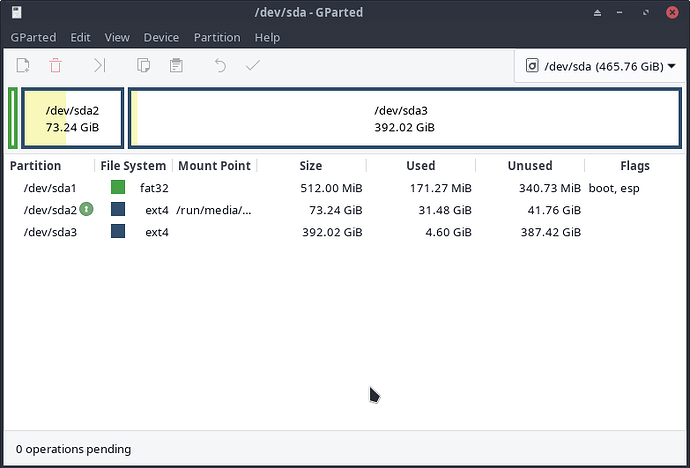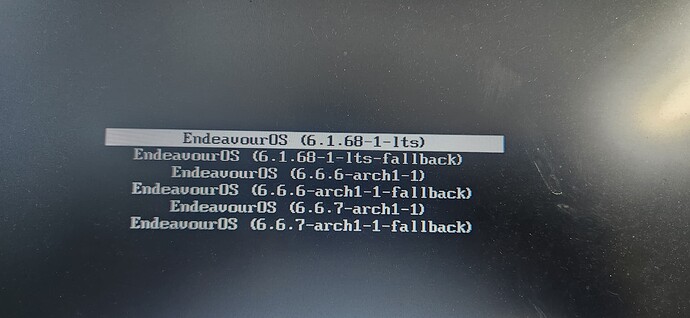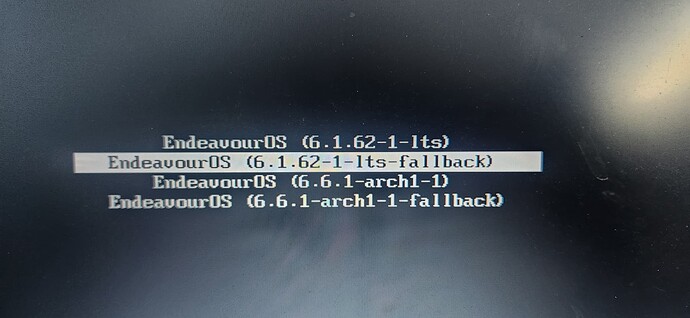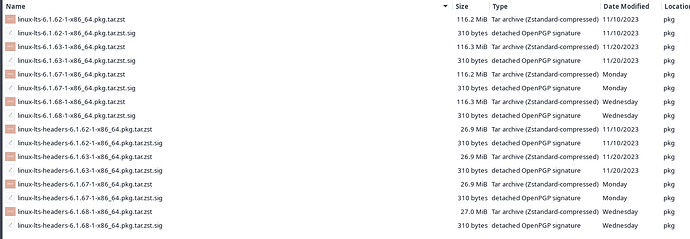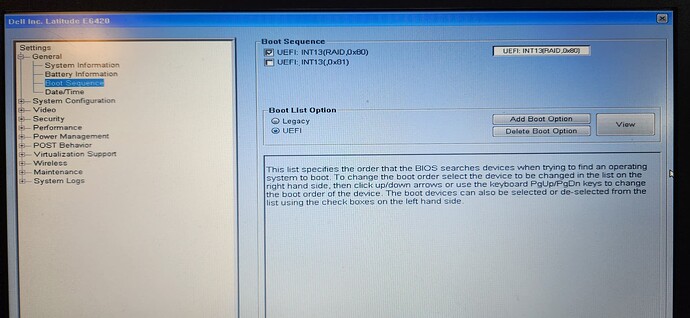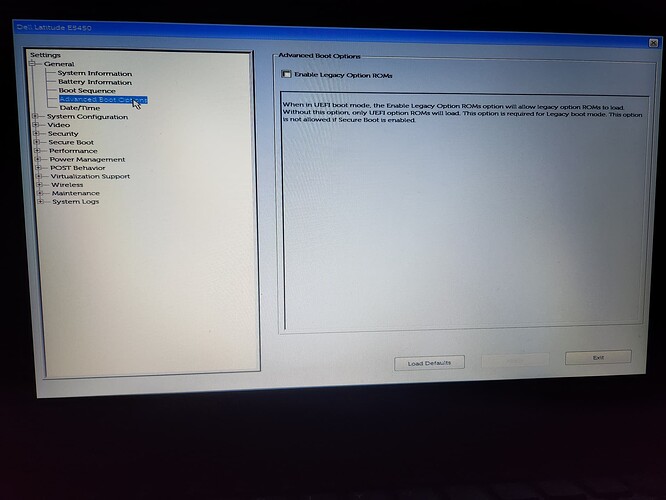I have been running a fresh installation after getting a black screen after an update. The new install has been running fine, even after a few updates. Tonight I did the update from the welcome screen, black screen again.
Boot starts then after selecting the image, I get black screen, no login and no terminal available.
I have been using EOS for a few years now, I do not want to change to another OS after testing so many. I have been happy with EOS until now. 2 black screen issues in one month after updates. I just got going again.
KDE Plasma desktop
I have installed the LTS version: 6.1.67-1-lts
Current OS installed from the below mentioned live ISO.
I am now running of a live ISO, details below:
calamares 22.12.3.6-4
firefox 116.0.1-1
linux 6.4.8.arch1-1
mesa 1:23.1.5-1
xorg-server 21.1.8-2 (xorg)
nvidia-dkms 535.86.05-2
Where do I start to get this fixed?
What commands can I run to give feedback for support?
It is no 01:00 am in SA. Will look for feedback in the morning.
Much appreciated.
Screenshot of partition setup
Results running inxi
System:
Host: EndeavourOS Kernel: 6.4.8-arch1-1 arch: x86_64 bits: 64 compiler: gcc
v: 13.2.1 Desktop: Xfce v: 4.18.1 tk: Gtk v: 3.24.36 info: xfce4-panel
wm: xfwm v: 4.18.0 vt: 1 dm: LightDM v: 1.32.0 Distro: EndeavourOS
base: Arch Linux
Machine:
Type: Laptop System: Dell product: Latitude E6420 v: 01
serial: Chassis: type: 9 serial:
Mobo: Dell model: 032T9K v: A02 serial: UEFI: Dell
v: A21 date: 11/14/2013
Battery:
ID-1: BAT0 charge: 31.7 Wh (100.0%) condition: 31.7/49.9 Wh (63.4%)
volts: 12.5 min: 11.1 model: Samsung SDI DELL 5G67C13 type: Li-ion
serial: 35723 status: full
CPU:
Info: dual core model: Intel Core i5-2520M bits: 64 type: MT MCP
smt: enabled arch: Sandy Bridge rev: 7 cache: L1: 128 KiB L2: 512 KiB
L3: 3 MiB
Speed (MHz): avg: 825 high: 900 min/max: 800/3200 cores: 1: 800 2: 900
3: 800 4: 800 bogomips: 19961
Flags: avx ht lm nx pae sse sse2 sse3 sse4_1 sse4_2 ssse3 vmx
Graphics:
Device-1: Intel 2nd Generation Core Processor Family Integrated Graphics
vendor: Dell driver: i915 v: kernel arch: Gen-6 ports: active: LVDS-1
empty: VGA-1 bus-ID: 00:02.0 chip-ID: 8086:0126 class-ID: 0300
Device-2: NVIDIA GF119M [NVS 4200M] vendor: Dell driver: nouveau v: kernel
arch: Fermi pcie: speed: 2.5 GT/s lanes: 16 ports: active: none empty: DP-1,
DP-2, HDMI-A-1, LVDS-2, VGA-2 bus-ID: 01:00.0 chip-ID: 10de:1056
class-ID: 0300 temp: 49.0 C
Device-3: Sunplus Innovation Laptop_Integrated_Webcam_FHD driver: uvcvideo
type: USB rev: 2.0 speed: 480 Mb/s lanes: 1 bus-ID: 1-1.5:4
chip-ID: 1bcf:2802 class-ID: 0e02
Display: server: X.Org v: 21.1.8 compositor: xfwm v: 4.18.0 driver: X:
loaded: modesetting alternate: fbdev,intel,nouveau,nv,vesa
dri: crocus,nouveau gpu: i915 display-ID: :0.0 screens: 1
Screen-1: 0 s-res: 1600x900 s-dpi: 96 s-size: 423x238mm (16.65x9.37")
s-diag: 485mm (19.11")
Monitor-1: LVDS-1 model: AU Optronics 0x313e res: 1600x900 hz: 60 dpi: 132
size: 309x174mm (12.17x6.85") diag: 355mm (14") modes: 1600x900
API: OpenGL v: 3.3 Mesa 23.1.5 renderer: Mesa Intel HD Graphics 3000 (SNB
GT2) direct-render: Yes
Audio:
Device-1: Intel 6 Series/C200 Series Family High Definition Audio
vendor: Dell 6 driver: snd_hda_intel v: kernel bus-ID: 00:1b.0
chip-ID: 8086:1c20 class-ID: 0403
Device-2: NVIDIA GF119 HDMI Audio vendor: Dell driver: snd_hda_intel
v: kernel pcie: speed: 2.5 GT/s lanes: 16 bus-ID: 01:00.1 chip-ID: 10de:0e08
class-ID: 0403
API: ALSA v: k6.4.8-arch1-1 status: kernel-api
Server-1: PipeWire v: 0.3.76 status: active with: 1: pipewire-pulse
status: active 2: wireplumber status: active 3: pipewire-alsa type: plugin
4: pw-jack type: plugin
Network:
Device-1: Intel 82579LM Gigabit Network vendor: Dell driver: e1000e
v: kernel port: 5080 bus-ID: 00:19.0 chip-ID: 8086:1502 class-ID: 0200
IF: eno1 state: up speed: 100 Mbps duplex: full mac: d4:be:d9:17:43:81
Device-2: Intel Centrino Ultimate-N 6300 driver: iwlwifi v: kernel pcie:
speed: 2.5 GT/s lanes: 1 bus-ID: 03:00.0 chip-ID: 8086:422b class-ID: 0280
IF: wlan0 state: down mac: d2:78:72:3f:82:16
Bluetooth:
Device-1: Dell DW375 Bluetooth Module driver: btusb v: 0.8 type: USB
rev: 2.0 speed: 12 Mb/s lanes: 1 bus-ID: 1-1.4:3 chip-ID: 413c:8187
class-ID: fe01 serial: D0DF9AB0F1C0
Report: rfkill ID: hci0 rfk-id: 0 state: up address: see --recommends
RAID:
Hardware-1: Intel 82801 Mobile SATA Controller [RAID mode] driver: ahci
v: 3.0 port: 5060 bus-ID: 00:1f.2 chip-ID: 8086:282a rev: N/A class-ID: 0104
Drives:
Local Storage: total: 472.99 GiB used: 31.57 GiB (6.7%)
ID-1: /dev/sda vendor: SanDisk model: SDSSDH3 500G size: 465.76 GiB
speed: 6.0 Gb/s tech: SSD serial: 191258460215 fw-rev: 00RL scheme: GPT
ID-2: /dev/sdb model: USB FLASH DRIVE size: 7.23 GiB type: USB rev: 2.0
spd: 480 Mb/s lanes: 1 tech: SSD serial: AA160805A4MJK1S6PNPT fw-rev: 1100
scheme: GPT
Partition:
ID-1: / size: 10 GiB used: 150.9 MiB (1.5%) fs: overlay source: ERR-102
Swap:
Alert: No swap data was found.
Sensors:
System Temperatures: cpu: 56.0 C mobo: 33.0 C sodimm: SODIMM C gpu: nouveau
temp: 50.0 C
Fan Speeds (RPM): cpu: 2882
Info:
Processes: 217 Uptime: 50m wakeups: 1 Memory: total: 8 GiB
available: 7.64 GiB used: 2.8 GiB (36.7%) Init: systemd v: 254
default: multi-user Compilers: gcc: 13.2.1 Packages: pm: pacman pkgs: 900
Shell: Bash v: 5.1.16 running-in: xfce4-terminal inxi: 3.3.28
